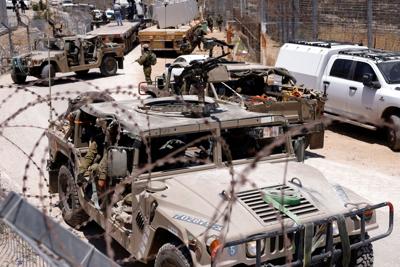Emboldened by a string of military triumphs, Israel is jumping into a geopolitical morass of its own making in neighbouring Syria.
It’s easy to be seduced by the myth of renewed Israeli military invincibility. Since the massacre of Israelis on Oct. 7, 2023, its armed forces have defanged Hamas in Gaza, neutered Hezbollah in Lebanon, hobbled the Houthis of Yemen and humiliated the Islamic Republic in Iran.
But Israel’s seeming winning streak comes at the cost of tens of thousands of lives lost in Gaza and beyond. Moreover, every victory comes with a false sense of security — and a history of hubris.
Now, amid its undeclared and unfinished war in Syria, Israel has once again turned its guns on Damascus and the Druze areas for no defensible reason. Self-defence has long been Israel’s mantra, but its overreach in Syria will only prove self-defeating.
Ostensibly, Israel’s latest incursions were a reaction to sectarian clashes pitting local Druze against Bedouin fighters and Syrian state security forces. All signs point to a classic clash of rival tribes and competing interests, a contest between sectarianism and security.
That Israel should risk getting bogged down in a mini civil war next door is not just a violation of international law — increasingly routine in the region. It also ignores the lessons of previous adventurism in Lebanon and beyond.
Prime Minister Benjamin Netanyahu argues that Israel’s national interests are impacted by the internecine quarrels within Syria. He claims an almost paternal stake in the fate of the minority Druze — who practice an offshoot of Shia Islam — because many of their fellow Druze live in the Golan Heights (annexed by Israel but recognized by Canada and the world as occupied Syrian territory).
“Israel is committed to preventing harm to the Druze in Syria due to the deep brotherly bond with our Druze citizens in Israel, and their historical and familial ties to the Druze in Syria,” he claimed in a joint statement with hardline Defence Minister Israel Katz. “We are acting to prevent the Syrian regime from harming them and to ensure the demilitarization of the area adjacent to our border.”
Yet those high-minded humanitarian impulses are at odds with Israel’s words and actions on the ground elsewhere.
In Lebanon, Israel has long demanded that the government in Beirut disarm the local Shiite Hezbollah militia. It has also insisted that the Lebanese armed forces be deployed to take control of border areas, arguing that only the state can bear weapons.
Moreover, Netanyahu has never exactly given expression to any “deep brotherly bond” with Palestinian Arab citizens of Israel, and their “historical and familial ties” to Palestinians at risk in Gaza and the occupied West Bank. While there are many Druze citizens of Israel, there are many more Palestinian citizens (formerly known as Israeli Arabs) who vote and work in the public service.
Where are the fraternal bonds of concern for all 1.9 million Palestinian citizens of Israel, who make up about 21 per cent of the country’s population (excluding the occupied West Bank and Gaza?
There is little doubt that atrocities have taken place against the Druze in Syria, who deserve protection as much as any endangered minority group. But given its overkill in Gaza, Israel is in no position to play the role of global police under the long-dormant principles of “responsibility to protect.”
True, Israel has helped persecuted peoples in the past — giving sanctuary to imperilled Jews from across North Africa and the Middle East, not to mention airlifts from Ethiopia (a historical wrinkle conveniently forgotten by those who insist the Zionism of today is an ethnocentric European Caucasian conceit). But when offering solidarity and sanctuary, Israel provided humanitarian airlifts — not lethal air strikes.
Is Netanyahu planning another invasion of the Islamic Republic of Iran to safeguard the roughly 10,000 Jews who still live there? Will he attack Iran again to rescue its imperilled Baha’i minority, given that the headquarters of that faith is in Haifa?
The incessant attacks — not least targeting the defence ministry in Damascus — are undermining Israel’s long-term interests. Israel is stoking sectarian rivalries while planting the seeds of bitter resentment in Syria’s nascent government and armed forces.
The more Israel humiliates Syria today, the more it will motivate Syrians to treat the Jewish state as an enemy tomorrow. That would be a missed opportunity.
For the new regime in Damascus deeply loathes Iran for treating Syria as a vassal state until the fall of al-Assad; the Russians, too, are resented for propping him up during years of civil war. With shared enemies in Iran and Russia, these erstwhile adversaries in Israel and Syria have much in common — and the enemy of my enemy is my ally.
Given Syria’s recent rapprochement with U.S. President Donald Trump, Israel had a far better option to act diplomatically, not military, to achieve its goals of safeguarding the Druze and securing its borders.
Military power offers the mirage of short term results. But diplomatic ententes are always the more enduring outcome — whether in Syria or, lest we forget, Gaza.
Error! Sorry, there was an error processing your request.
There was a problem with the recaptcha. Please try again.
You may unsubscribe at any time. By signing up, you agree to our terms of use and privacy policy. This site is protected by reCAPTCHA and the Google privacy policy and terms of service apply.
Want more of the latest from us? Sign up for more at our newsletter page.

































